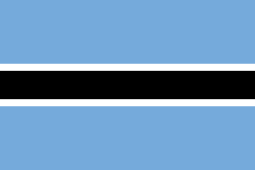Languages of Botswana
| Languages of Botswana | |
|---|---|
| Official languages | English |
| National languages | Tswana |
| Part of a series on the |
| Culture of Botswana |
|---|
 |
| History |
| People |
| Languages |
| Cuisine |
| Religion |
| Art |
|
Music and performing arts |
| Sport |
|
Monuments |
|
Symbols |
|
The official language of Botswana is English, which was inherited from colonial rule (see: Bechuanaland Protectorate). Setswana is spoken by the majority of the population, but there are over 20 much smaller languages. Botswana consists of many dying languages and also many expanding languages.
Official languages
Business
The official business language of Botswana is English. It is useful for people to speak English, as most of the written communication and official business texts are written in English.
Spoken
The main spoken language of Botswana is Setswana. Setswana is spoken by most of the population. It is often used as a purely spoken language, as most written things are written in English.[1]
Other languages
Although there are two clear official languages, there are other languages that a large percentage of the population speaks. Over 90% of the population speak a Bantu language natively. The most common Bantu languages spoken are Tswana/Setswana (estimated to be spoken natively by 77.3%, though the real number may by higher), Kalanga (7.4%), Kgalagadi (3.4%), Shona (2%), Mbukushu (1.6%) and Ndebele (1%). 1.7% speak Tshwa (a Khoe language) and 0.1% speak !Xóõ, a Tuu language (both non-Bantu). A further 2.8% also can speak English, the official language as their first language, and a small number can speak Afrikaans.[2]
References
- ↑ "The Languages spoken in Botswana". Studylands. Retrieved 2016-10-24.
- ↑ "The World Factbook — Central Intelligence Agency". www.cia.gov. Retrieved 2016-09-19.